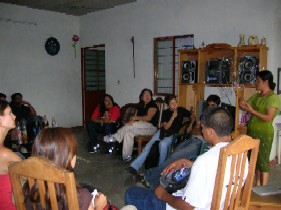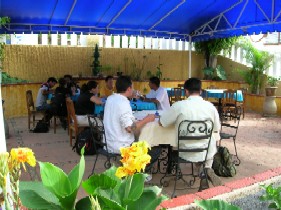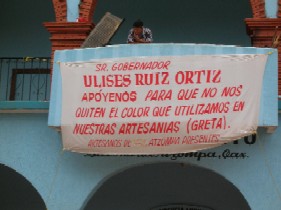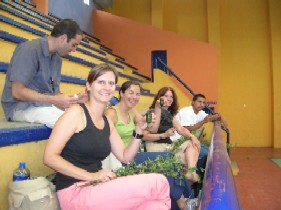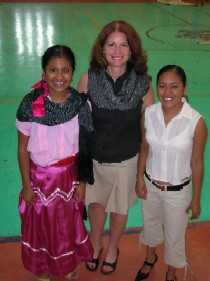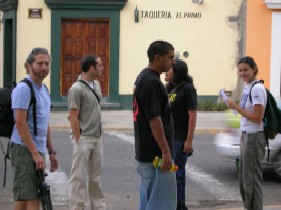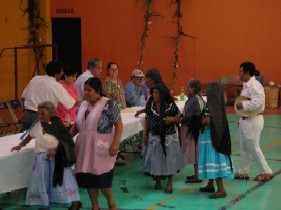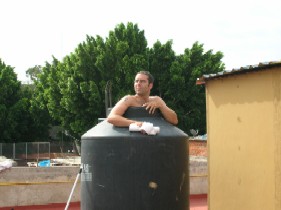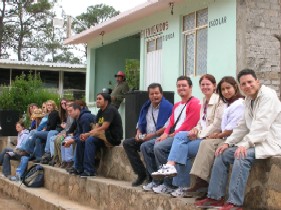
Field Schools
I have managed a field school in Oaxaca, Mexico since 2003. The field school focuses on ethnographic field methods and works with the communities of Santa María Atzompa, Zimatlán de Alvarez, and San Pablo Huixtepec as primary field sites. Atzompa has been my primary research site since 1994 and students are able to enjoy a warm and inviting reception from the community as well as my personal friends, goddaughters and compadres. At the same time, students become aware of the larger issues that the community is wrestling with including severe health issues resulting from lead exposure, population growth that challenges long-held practices of community involvement and politics, and negotiations of gender and household structures resulting from participation in the global tourist industry. In Zimatlán, students work with the NGO Centeotl, A.C., in providing support for their micro-credit program, amaranth farming and production, nutritional assessment, and health promotion. And in San Pablo Huixtepec, students work with community leaders and youth groups on a variety of projects that work toward integrating their migrant families in California and those that remain in San Pablo. Each year the student researchers focus on particular research topics that are discussed with community leaders prior to the summer program. In recent years these have included the study of ceramic production as it relates to lead exposure from the glazing process; a market analysis that focused on food consumption patterns and emerging market opportunities for new foodstuffs; nutritional assessment and outreach; training of promotoras de nutricion; analysis of the micro-credit program and its future; chapuline production and exportation to the US; archival restoration, preservation and digitization; migration histories; deported youth and reintegration; tourism; and an analysis of female business owners' strategies for balancing work, home, and community. Each year students benefit from the previous years' data and are able to tap on established relationships with community members as well as establish new ones.
While in the field students participate in discussions with key community leaders, conduct interviews with community members, elicit oral histories, produce social maps of particular cultural phenomenon, and enjoy themselves in local community fiestas while actively learning and practicing various research methodologies. The class portion of the field school is conducted at the Instituto Welte para Estudios Oaxaqueños in Oaxaca city where students are able to utilize the facilities of the research library that include the largest collection of works on Oaxaca in Mexico, a wireless internet environment, a private cafe and outdoor garden area. The class is limited to fifteen students and priority is given to graduate students although many undergraduates who have been brave enough to join us have returned to Oaxaca for graduate research work. Undergraduates interested in developing full research projects have received funding from MIRT and McNair to attend the summer program. Graduate students qualify for travel funds through the Associated Students.
Students involved in the field school have presented their findings at the AAA meetings and at the SfAA meetings. Several graduate students have included or are currently producing theses on their research conducted during the field school that is then refined and developed for additional research in the following summer. Students participating in the program have gone on to publish their findings, obtain various grants including Fulbright Fellowships, Ford Foundation Fellowships, Tinker Fellowships, and Sally Cassanova Predoctoral Fellowships.
I am currently working on a field school in the US/Mexico border space that will focus on issues of access, economy, health, housing, and survival strategies.
Internships
I have been able to establish internship opportunities with various organizations around San Diego and in Tijuana, Managua (Nicaragua), Rio de Janeiro (Brazil). The internships in San Diego include working with indigenous children and adults in obtaining English and Spanish language skills while adapting to the US; working in shelters for unaccompanied minors in San Diego while the youth await incorporation or deportation; working in outreach programs designed to prepare underrepresented youth for college; working at charter bilingual charter schools in tutoring and classroom engagement. In Tijuana the internships include volunteering at shelters for recently deported adults and youth and at an organization that trains interns as promotoras of health, reproduction rights, sexuality, and domestic violence. In Managua the internships include work at a clinic and shelter for women and at an LGBTQ center. In Rio de Janeiro the internship is in a rural area and focuses on environmental alternatives including water capture and filtration, recycling, refuse control, sustainable agroforestry and environmentally sustainable construction. The internships are managed out of the Center for Latin American Studies and open to all students.
